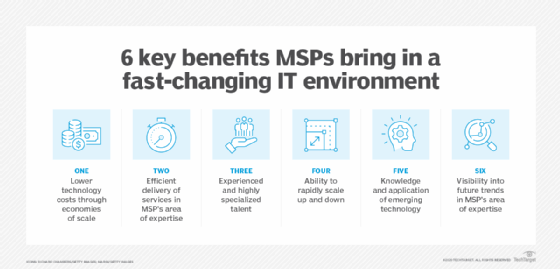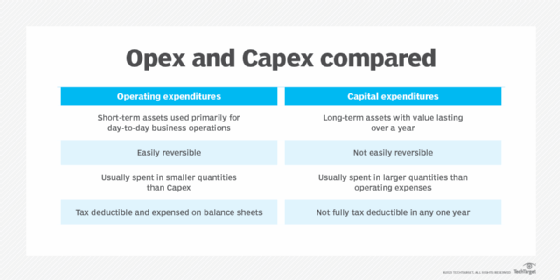What is hardware as a service (HaaS)?
Hardware as a service (HaaS) is a procurement model that's similar to leasing or licensing. Hardware that belongs to a managed service provider (MSP) is installed at a customer's site and a service level agreement (SLA) defines the responsibilities of both parties.
Sometimes HaaS clients pay a monthly fee for using the hardware; sometimes its use is incorporated into the MSP's fee structure for installing, monitoring and maintaining the hardware. Either way, if the hardware breaks down or becomes outdated, the MSP is responsible for decommissioning and replacing it.
Depending upon the terms of the SLA, decommissioning may include wiping proprietary data, physically destroying hard drives and certifying that old equipment has been legally recycled.
The HaaS model can be a cost-effective way for small or mid-sized businesses to provide employees with state-of-the-art hardware without large upfront costs. HaaS can be contrasted with infrastructure as a service and managed hosting, which are procurement models where the hardware is housed at the MSP's site.
In a grid computing context, HaaS is a pay-as-you-go model for accessing a provider's infrastructure and central processing unit (CPU) power. Grid computing is a technology in which several computers work together to act as a single, more powerful computer.
Some companies sell use of their grids and CPUs over the internet on a per-use basis. The user sends data and a program to process that data; the vendor's grid does the processing and returns the result. Amazon's Relational Database Service and Microsoft's Azure are examples of this approach.

How hardware as a service works?
HaaS providers charge customers for use of their infrastructure hardware instead of for the hardware itself. Usage is calculated through various financial models and pricing plans, such as a monthly fee or subscription model, use duration-based fees, telemetry-based fees, and service-specific fees. These services give businesses access to the latest technology without large upfront investments.
The MSP assumes the responsibility of monitoring, maintaining, updating, upgrading and replacing the hardware. This relieves businesses from having to do ongoing maintenance and ensures they always have access to functioning and up-to-date equipment.
HaaS can include additional services such as installation, training, remote monitoring, maintenance and support. These extra services can enhance the overall value and functionality of the hardware for the users. HaaS also includes warranties and support plans.
Benefits of HaaS
HaaS has many benefits for both organizations and manufacturers. The most important are the following:
- Cost. HaaS reduces the customer's upfront capital expenses, allowing businesses to shift allocations from their capital expenditure (Capex) budget to the operating expense budget (Opex) and free up cash flow. Capex purchases have tax benefits over multiple years as the equipment's value depreciates and the amortized value is deducted from annual, taxable revenue. On the other hand, Opex expenses are accounted for within a year, so the amount deducted from revenue -- that is, the amount spent on equipment rental in one year -- would be accounted for in that single year. Upper management is more likely to approve Opex purchases as opposed to Capex ones, which typically require several layers of management approval.
- Equipment updates. A well-negotiated HaaS management contract provides regular hardware updates so the client is usually working with state-of-the art equipment. However, if the MSP contract doesn't specify how often new equipment is provided, clients might find they ae working with out-of-date equipment.
- Maintenance. HaaS providers are responsible for maintaining and troubleshooting the equipment they provide.
- Scalability and adaptability. HaaS's scalability lets organizations adjust their IT infrastructure based on their business needs without major investments. This can be important for businesses experiencing growth, seasonal changes and varying project demands.
- Enhanced security. HaaS providers typically include advanced security measures in their services to protect against cyberthreats and ensure compliance with regulatory standards. Regular updates and proactive management of security protocols can significantly reduce the risk of security breaches.
- Environmental sustainability. HaaS promotes a circular economy model, contributing to environmental sustainability. Providers often refurbish, repurpose or recycle hardware, reducing electronic waste and promoting resource efficiency, which is a best practice of environmental, social and governance and corporate social responsibility.

Challenges of HaaS
The HaaS business model also has challenges:
- Ongoing cross-functional coordination. This can require consistent interaction among various teams.
- Sales complexities. HaaS's multifaceted components, often involving both outright sales and recurring charges, complicate the sales, quoting and billing processes.
- Asset management issues. A shift from traditional Capex models necessitates a continuous relationship with customers, demanding a deeper understanding of asset management over time.
- Financing complications. Finance teams can become a bottleneck because of the extensive data needed for financial operations.
- Service disruptions. Dependency on service providers introduces risks such as potential downtimes and service disruptions, which can impact business continuity and customer relationships.
- Contract complexities. HaaS contracts can include unfavorable exit or buyout clauses should the customer wish to end the contract early.
- Data security. Organizations entrust sensitive data to MSPs, exposing them to additional risks.
Examples of HaaS
The hardware-as-a-service model is used in many different applications, including fleet management, restaurants and food service, office equipment, mobile technology, inventory management, remote conferencing hardware, and security and surveillance.
Security and compliance
HaaS provides organizations with new hardware while also enhancing security measures and simplifying compliance. With HaaS, responsibility for maintaining security standards, including regular updates and patches, shifts from customer to provider. This is key to a successful HaaS relationship, ensuring all systems are protected against the latest threats and reducing the risk of security vulnerabilities from aging hardware.
HaaS service offerings are also adhere to regulatory compliance standards, which can make them an effective part of a proactive cybersecurity strategy. By outsourcing hardware management, businesses can focus on their core operations while leaving security and compliance to HaaS providers. This approach not only secures data but also streamlines the compliance process, as HaaS providers must incorporate security protocols to meet regulatory requirements such as the Health Insurance Portability and Accountability Act for healthcare companies and the Sarbanes-Oxley Act.
HaaS providers use advanced security measures. These include end-to-end encryption and multifactor authentication. Regular audits and incident response plans are also part of HaaS security frameworks.
Hardware as a service licenses managed service providers' hardware to customers. Learn the ways to improve MSP marketing and sales.





